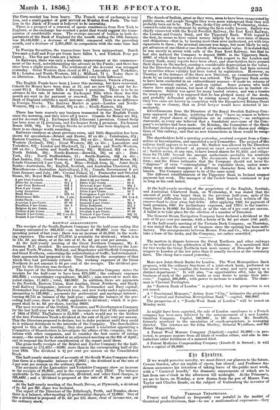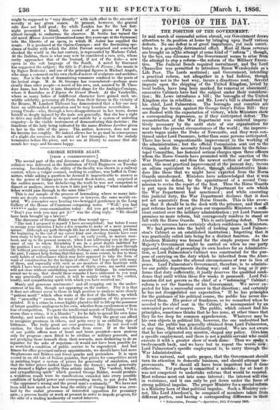Psitistare TieskrazusLs.
France and England so frequently run parallel in the matter of theatrical productiveness, that-to use a mathematical expression-they might be supposed to "vary &raptly " 'with each other in the amount of novelty at any given s'settison. At -present, however, the general rule does not hold good • for White 7London has for the last fort- night presented a blank, the crowd of new pieces at Paris is almost enough to embarrass the observer. M. Scribe has turned the old novel Mason Lesedid (drimatized some five years ago at the Gymnase) into t]m libretto of an opera, to which M. Auber has supplied the music. It is produced at the Opera-Comique ; and the fascinating spe- cimen of frailty with which the Abbe l'revost surprised and somewhat shocked the world in the last century, is represented by Madame Cabel. At the Italiens, there is what may now be considered a rara avis, whose rarity approaches that of the bustard, if not of the dodo--a new opera in the soft language of the South. A novel by Guerazzi has suggested the subject ; the title is L° Assedie di Firenze' the music is by Signor Bottesini ; and one of the principal figures is Michael Angelo who sings a cerement on his own Chefs-d'eeuvre of sculpture and architec- ture. Nor is the task of dramatizing romances confined to the poets of the lyrical stage. M. de St. Georges has remembered—perhaps more clearly than other people—a novel of his own, and, assisted by M. Theo- dore Anne has hewn it into theatrical shape for the Ambigu-Comique, where it Anne, as L'Espion du Grand Hands. At the Vaudeville, where so many lathes of indifferent character have gained such un- wieldy celebrity, governing all Paris from their throne in the vicinity of the Bourse, M. Lambert Thiboust has demonstrated that a fair one may have an unblemished reputation and be very heartless nevertheless. A. young Creole--who, through a love-disappointment in her teens, deems herself so deeply injured by the male sex generally, that she has a right to drive any individual to despair and suicide by a system of unfeeling coquetry—is the visible instrument of demonstrating this doctrine; the functions of the lady being indicated by the name Madame Lovelace given to her in the title of the piece. The, author, however, does not use his heroine too roughly. He indeed allows her to go mad in consequence of a slight she receives in the midst of her triumphs ; but the malady terminates before the piece, and we are at liberty to assume that she mends her ways and becomes happy.



































 Previous page
Previous page